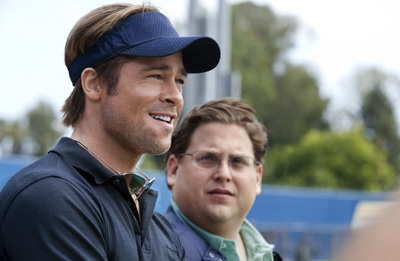This article was first published on Culturewatch. © Tony Watkins, 2011

Billy Beane (Brad Pitt) sits brooding in the empty Oakland Coliseum stadium. He switches on his radio to listen for a few moments to the commentary of a baseball game, then turns it off. It’s only moments before he turns it on again. Off. On. Off. A little later, as Billy sits in his truck, it is clear from the snatches of commentary that the Oakland A’s have lost the match. He hurls the radio out of the window into the rain before climbing out of the truck to angrily stamp on it. It’s October 2001, and the A’s, the team for which Beane is general manager, has just lost the American League play-offs to the New York Yankees. The problem, as Beane sees it, is that the wealthy teams can pay huge salaries to buy the best players, leaving modestly funded teams like the A’s unable to compete on equal terms. And straight after the play-offs, those rich teams rub salt in Beane’s wound by poaching his star players. It’s a classic sporting underdog story. Bennett Miller’s engaging Moneyball, written by Aaron Sorkin (reworking an earlier script by Steven Zaillian), is based on a non-fiction book of the same name by Michael Lewis which explains how a statistical approach to baseball, developed by Bill James, transformed the game, starting with Billy Beane’s 2002 team. The arc of the film is, therefore, familiar – in that the story is about the changing fortunes of a losing team – yet also refreshingly unfamiliar in that the focus is on changing attitudes rather than achieving success.
The solution is obvious: the A’s needs more money. ‘I can't compete against a hundred and twenty million payroll with thirty eight million dollars,’ Beane complains to the team's co-owner, Steve Schott (Robert Kotick). But Schott insists, ‘We’re going to work with the constraints that we have. . . . I'm asking you to take a deep breath, shake off the loss, get back in a room with your guys and figure out how to find replacements for the guys we lost with the money that we do have.’ Billy is ambitious, determined, and haunted by the spectre of failure. So if the obvious solution is not an option, he will need to find another approach. By the time he meets with his scouts to consider players for next season, he has concluded that the game is fundamentally unfair because it all comes down to money. And he knows that the conventional ways of assessing the worth of a player are flawed. As a young man, Billy had turned down a scholarship to Stanford in favour of joining the New York Mets because, the scouts had said, he had the makings of a baseball superstar. Only it hadn’t happened. All Beane’s promise as a player had come to nothing; the scouts had been wrong. Now, he is certain, they must think differently.
The difficulty is always how to find a significantly different perspective. How are we looking at things within the wrong framework? How can challenges be approached in a different way? Louis Pasteur once noted, ‘chance favours only the prepared mind,’ so when Billy Beane meets with his opposite number at the Cleveland Indians, his mind is ready to notice the discreet influence of one of their front office team: Peter Brand (Jonah Hill). After the meeting, Beane quizzes Brand about his role, and discovers that this young economist, just out of Yale, has precisely the alternative perspective that the A’s need. ‘There is an epidemic failure within the game to understand what is really happening,’ he says, ‘and this leads people who run major league baseball teams to misjudge their players and mismanage their teams. . . . Baseball thinking is medieval. They’re asking all the wrong questions and if I say it to anybody I’m ostracized.’
Beane wastes no time in recruiting Brand as his assistant so that the young man can bring his mathematical approach to finding players. ‘We'll find the value of players that nobody else can see,’ he tells his new boss. ‘People are overlooked for a variety of biased reasons and perceived flaws: age, appearance, personality. Of the 20,000 notable players for us to consider, I believe there’s a championship team of 25 people that we can afford because everyone else in baseball undervalues them. Like an island of misfit toys.’ Together, the two men identify a number of players whose careers had been all but written off, or who were considered almost worthless. But in everyone else’s mind, it is a completely wrong-headed approach; Billy is ignoring years of accumulated wisdom in favour of some economist’s computer projections.

Sport is a rich source of metaphors for life, and the central thread of Moneyball reflects the way in which the value we place on people is so often subjective and superficial. Peter Brand, for example, is the sort of person who is often undervalued: far from being athletic and cool, he is overweight, diffident and nerdy. One of Beane’s new acquisitions, Scott Hatteberg (Chris Pratt), was considered of no value after an injury to a nerve in his elbow, but Beane and Brand knew that he still had immense value – if he learnt new skills to play in a new position. The Oakland A’s as a whole was looked down on as a hard-up team (especially when Beane signed up a collection of ‘losers’), but once each individual’s specific contribution was properly recognised, it became a powerful force which could give the rich teams a run for their money.
Billy learns to re-evaluate himself as well as others. He comes to understand that his unsuccessful career in baseball was a result of being swept along by other people’s views of what he could and should be. He comes to think differently about what really has value in life, and when he is faced with a similar choice to the one he faced as a teenager, he takes a radically different decision. Having been in a situation of desperation, he was forced to look at things differently, and, with Peter’s help, he learns to look beyond the obvious to the things that really matter.
The real value of a person is not on the surface, in baseball or in life. Indeed, the true worth of a person as a person, rather than as a baseball player, is not revealed by any statistical analysis, but by what they do, how they speak and behave towards others, how they respond to adversity, and a host of other actions that we might easily overlook in a world preoccupied with money, status and looks. As Jesus noted, ‘A tree is identified by its fruit. Figs are never gathered from thorn bushes, and grapes are not picked from bramble bushes. A good person produces good things from the treasury of a good heart, and an evil person produces evil things from the treasury of an evil heart. What you say flows from what is in your heart’ (Luke 6:44–45). Billy finally recognises that his worth does not lie in achieving victory in the play-offs, but in who he is: what he contributes to the team as a whole and, even more, his role as a father. From a Christian perspective, one would want him to go even further and discover that his true worth is found in his standing with God, but he nevertheless becomes a more rounded human being who has discovered the immense value of looking beyond the surface. Whether he is aware of it or not, his approach actually reflects that of God, who ‘chose things the world considers foolish in order to shame those who think they are wise. And he chose things that are powerless to shame those who are powerful’ (1 Corinthians 1:27). There’s a warning, and an encouragement, in this for all of us: the value this world puts on people is, all too often, a result of looking at things from the wrong perspective altogether.
Billy Beane (Brad Pitt) sits brooding in the empty Oakland Coliseum stadium. He switches on his radio to listen for a few moments to the commentary of a baseball game, then turns it off. It’s only moments before he turns it on again. Off. On. Off. A little later, as Billy sits in his truck, it is clear from the snatches of commentary that the Oakland A’s have lost the match. He hurls the radio out of the window into the rain before climbing out of the truck to angrily stamp on it. It’s October 2001, and the A’s, the team for which Beane is general manager, has just lost the American League play-offs to the New York Yankees. The problem, as Beane sees it, is that the wealthy teams can pay huge salaries to buy the best players, leaving modestly funded teams like the A’s unable to compete on equal terms. And straight after the play-offs, those rich teams rub salt in Beane’s wound by poaching his star players. It’s a classic sporting underdog story. Bennett Miller’s engaging Moneyball, written by Aaron Sorkin (reworking an earlier script by Steven Zaillian), is based on a non-fiction book of the same name by Michael Lewis which explains how a statistical approach to baseball, developed by Bill James, transformed the game, starting with Billy Beane’s 2002 team. The arc of the film is, therefore, familiar – in that the story is about the changing fortunes of a losing team – yet also refreshingly unfamiliar in that the focus is on changing attitudes rather than achieving success.
The solution is obvious: the A’s needs more money. ‘I can't compete against a hundred and twenty million payroll with thirty eight million dollars,’ Beane complains to the team's co-owner, Steve Schott (Robert Kotick). But Schott insists, ‘We’re going to work with the constraints that we have. . . . I'm asking you to take a deep breath, shake off the loss, get back in a room with your guys and figure out how to find replacements for the guys we lost with the money that we do have.’ Billy is ambitious, determined, and haunted by the spectre of failure. So if the obvious solution is not an option, he will need to find another approach. By the time he meets with his scouts to consider players for next season, he has concluded that the game is fundamentally unfair because it all comes down to money. And he knows that the conventional ways of assessing the worth of a player are flawed. As a young man, Billy had turned down a scholarship to Stanford in favour of joining the New York Mets because, the scouts had said, he had the makings of a baseball superstar. Only it hadn’t happened. All Beane’s promise as a player had come to nothing; the scouts had been wrong. Now, he is certain, they must think differently.
The difficulty is always how to find a significantly different perspective. How are we looking at things within the wrong framework? How can challenges be approached in a different way? Louis Pasteur once noted, ‘chance favours only the prepared mind,’ so when Billy Beane meets with his opposite number at the Cleveland Indians, his mind is ready to notice the discreet influence of one of their front office team: Peter Brand (Jonah Hill). After the meeting, Beane quizzes Brand about his role, and discovers that this young economist, just out of Yale, has precisely the alternative perspective that the A’s need. ‘There is an epidemic failure within the game to understand what is really happening,’ he says, ‘and this leads people who run major league baseball teams to misjudge their players and mismanage their teams. . . . Baseball thinking is medieval. They’re asking all the wrong questions and if I say it to anybody I’m ostracized.’
Beane wastes no time in recruiting Brand as his assistant so that the young man can bring his mathematical approach to finding players. ‘We'll find the value of players that nobody else can see,’ he tells his new boss. ‘People are overlooked for a variety of biased reasons and perceived flaws: age, appearance, personality. Of the 20,000 notable players for us to consider, I believe there’s a championship team of 25 people that we can afford because everyone else in baseball undervalues them. Like an island of misfit toys.’ Together, the two men identify a number of players whose careers had been all but written off, or who were considered almost worthless. But in everyone else’s mind, it is a completely wrong-headed approach; Billy is ignoring years of accumulated wisdom in favour of some economist’s computer projections.

Sport is a rich source of metaphors for life, and the central thread of Moneyball reflects the way in which the value we place on people is so often subjective and superficial. Peter Brand, for example, is the sort of person who is often undervalued: far from being athletic and cool, he is overweight, diffident and nerdy. One of Beane’s new acquisitions, Scott Hatteberg (Chris Pratt), was considered of no value after an injury to a nerve in his elbow, but Beane and Brand knew that he still had immense value – if he learnt new skills to play in a new position. The Oakland A’s as a whole was looked down on as a hard-up team (especially when Beane signed up a collection of ‘losers’), but once each individual’s specific contribution was properly recognised, it became a powerful force which could give the rich teams a run for their money.
Billy learns to re-evaluate himself as well as others. He comes to understand that his unsuccessful career in baseball was a result of being swept along by other people’s views of what he could and should be. He comes to think differently about what really has value in life, and when he is faced with a similar choice to the one he faced as a teenager, he takes a radically different decision. Having been in a situation of desperation, he was forced to look at things differently, and, with Peter’s help, he learns to look beyond the obvious to the things that really matter.
The real value of a person is not on the surface, in baseball or in life. Indeed, the true worth of a person as a person, rather than as a baseball player, is not revealed by any statistical analysis, but by what they do, how they speak and behave towards others, how they respond to adversity, and a host of other actions that we might easily overlook in a world preoccupied with money, status and looks. As Jesus noted, ‘A tree is identified by its fruit. Figs are never gathered from thorn bushes, and grapes are not picked from bramble bushes. A good person produces good things from the treasury of a good heart, and an evil person produces evil things from the treasury of an evil heart. What you say flows from what is in your heart’ (Luke 6:44–45). Billy finally recognises that his worth does not lie in achieving victory in the play-offs, but in who he is: what he contributes to the team as a whole and, even more, his role as a father. From a Christian perspective, one would want him to go even further and discover that his true worth is found in his standing with God, but he nevertheless becomes a more rounded human being who has discovered the immense value of looking beyond the surface. Whether he is aware of it or not, his approach actually reflects that of God, who ‘chose things the world considers foolish in order to shame those who think they are wise. And he chose things that are powerless to shame those who are powerful’ (1 Corinthians 1:27). There’s a warning, and an encouragement, in this for all of us: the value this world puts on people is, all too often, a result of looking at things from the wrong perspective altogether.